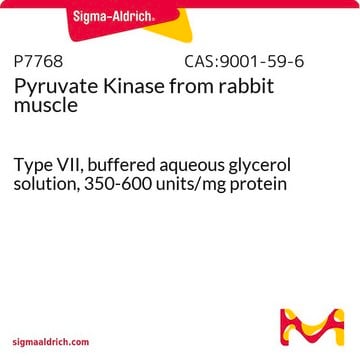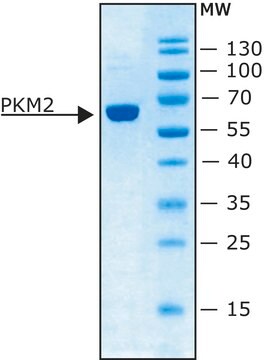MAK072
Pyruvate Kinase Activity Assay Kit
sufficient for 100 colorimetric or fluorometric tests
About This Item
Recommended Products
usage
sufficient for 100 colorimetric or fluorometric tests
detection method
colorimetric
fluorometric
relevant disease(s)
hematological disorder; cancer
storage temp.
−20°C
General description
The Pyruvate Kinase Activity Assay Kit provides a simple and direct procedure for measuring pyruvate kinase activity in a variety of biological samples. Pyruvate concentration is determined by a coupled enzyme assay, which results in a colorimetric (570 nm)/ fluorometric (λex = 535/λem = 587 nm) product, proportional to the pyruvate present. One unit of pyruvate kinase is the amount of enzyme that will transfer a phosphate group from PEP to ADP to generate 1.0 μmole of pyruvate per minute at 25 °C.
Application
Suitability
Principle
replaced by
Signal Word
Danger
Hazard Statements
Precautionary Statements
Hazard Classifications
Aquatic Chronic 3 - Resp. Sens. 1 - Skin Sens. 1
Storage Class Code
10 - Combustible liquids
Certificates of Analysis (COA)
Search for Certificates of Analysis (COA) by entering the products Lot/Batch Number. Lot and Batch Numbers can be found on a product’s label following the words ‘Lot’ or ‘Batch’.
Already Own This Product?
Find documentation for the products that you have recently purchased in the Document Library.
Customers Also Viewed
Articles
Warburg effect enhances glucose to lactate conversion in tumor cells, regardless of oxygen levels; impacting cancer metabolism since 1924.
Warburg effect enhances glucose to lactate conversion in tumor cells, regardless of oxygen levels; impacting cancer metabolism since 1924.
Warburg effect enhances glucose to lactate conversion in tumor cells, regardless of oxygen levels; impacting cancer metabolism since 1924.
Warburg effect enhances glucose to lactate conversion in tumor cells, regardless of oxygen levels; impacting cancer metabolism since 1924.
Our team of scientists has experience in all areas of research including Life Science, Material Science, Chemical Synthesis, Chromatography, Analytical and many others.
Contact Technical Service







